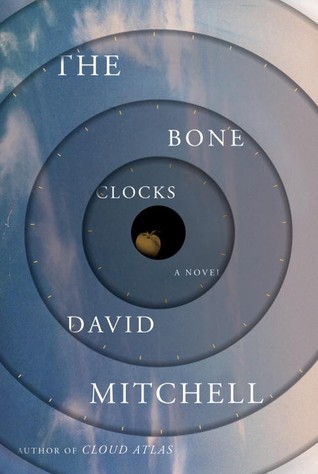Review: David Mitchell’s “The Bone Clocks”
by Miles Raymer
Two hundred or so pages in, I had high hopes for David Mitchell’s The Bone Clocks. The novel grabbed me right from the start, showing all the signs of another brilliant yarn from one of the UK’s most talented living authors. Mitchell has a unique gift for inhabiting the minds of different narrators, and for weaving seemingly-unrelated narratives into a coherent whole. Those talents are on display here, though put to far poorer use than in Mitchell’s earlier masterpiece, Cloud Atlas. Ultimately, The Bone Clocks is an impressive but desultory novel that never quite settles on what sort of story it wants to be. And perhaps that was the author’s intent, but if so, I don’t think it produced a very good book, and certainly not a great one.
It should go without saying that a “less than spectacular” David Mitchell novel is still better than almost any other modern fiction. Mitchell has a seemingly limitless capacity for articulating trenchant insights about the human condition; his understanding of the relationship between mortality and time is especially acute, and a central focus of The Bone Clocks. We are also treated to many affecting ruminations about the nature of love, writing, war, the fragility of brains and civilizations, and the many murky paths to self-justification. Mitchell’s ability to churn out elite-quality prose is considerable; his language is energetic and delectably playful throughout. Consider this passage:
“What if heaven is real, but only in moments? Like a glass of water on a hot day when you’re dying of thirst, or when someone’s nice to you for no reason, or…” Mam’s pancakes with Mars Bars sauce; Dad dashing up from the bar just to tell me, “Sleep tight don’t let the bedbugs bite”; or Jacko and Sharon singing “For She’s a Squishy Marshmallow” instead of “For She’s a Jolly Good Fellow” every single birthday and wetting themselves even though it’s not at all funny; and Brendan giving his old record player to me instead of one of his mates. “S’pose heaven’s not like a painting that’s just hanging there forever, but more like…like the best song anyone every wrote, but a song you only catch in snatches, while you’re alive, from passing cars, or…upstairs windows when you’re lost…” (35, emphasis his)
This excerpt is an uncommonly beautiful piece of writing, but feels par for the course when compared to the numerous other bits of beauty stowed between the covers of The Bone Clocks. For language lovers, there’s plenty to feast on.
Unhappily, Mitchell’s genius can’t save him from his spotty subject matter. The story vacillates between the mundane, quotidian components of human life and a fantastical psychosphere populated by superhuman figures wielding a hodgepodge of mental faculties that are usually relegated to the dustbins of intelligent discourse. Mitchell’s at his best when describing the first moments of someone’s day or the hardships of unrequited young love, but commands rather less gravitas when describing souls flying between bodies and duels between people with supernatural mental powers.
The big fault here is Mitchell’s decision to utilize the language of New Agey nonsense rather than constructing an independent lexicon for super-mental qualities. He readily creates all kinds of great terms from scratch (e.g. psychosoterica, subspeaking, transversing, suasion, Atemporals, etc.), but mixes these terms with well known labels for occult gobbledygook (e.g. chakras, third eyes, telekinesis). We can speculate that he may have done so to make his ideas more palatable to a certain kind of audience, but then we must also admit that he risks alienating other types of readers by associating his august imagination with silly ideas. It’s not the invocation of the supernatural itself that’s offputting, but rather the way Mitchell degrades his own ideas by polluting them with lesser concepts.
Even so, we must admit that Mitchell cobbles together a psycho-system with a fair degree of internal consistency, albeit beleaguered by at least one element that proves frustratingly vague (the “Scripting” and “Counterscripting” blather simply never makes a lick of sense). The narrative moves steadily from the early 1980s into the 2040s, laying out a series of detailed snapshots of times gone by, the global present, and speculations about what’s to come. The story gains steam but loses sharpness as the “mere mortal dragged into the games of gods” element takes over, focusing on an “invisible war” between two secret societies, one only marginally more likable (but considerably more moral) than the other. The war’s climax is unmistakably cool and wonderfully wrought, but then we have to wade through a 75-page denouement that feels unnecessarily lugubrious and half-baked. The final paragraphs, though beautiful in their own way, didn’t move me the way I wanted them to.
What to say when an author of Mitchell’s caliber lets me down? Well, it’s really no cause for serious lamentation. Likelier than not, he’ll dazzle me the next time around.
Rating: 6/10
